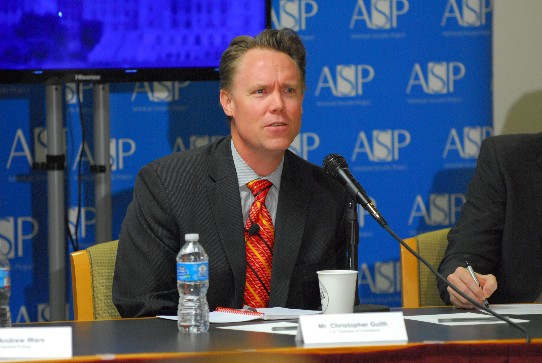
Event Recap: Natural Gas/LNG – Using American Resources and Know-How to Build a World Market
Podcast: Play in new window | Download
Subscribe: Apple Podcasts | RSS
The emerging geopolitics of energy shows why it is important for the United States to take a leadership role in exporting Liquefied Natural Gas (LNG). Internationally high demand and our domestic resources have created an opportunity to build a global, market-based energy economy. This will be particularly important in preventing monopoly energy producers from using their control of gas markets to sway foreign policy.
Marik String, a nonresident Senior Fellow in the International Security program at the Atlantic Council, chaired a panel of industry experts to talk about America’s role in building a world market for LNG. The panelist were Jennifer Harris, a Senior Fellow at the Council on Foreign Relations, Christopher Guith, Senior Vice President for Policy at the US Chamber of Commerce’s Institute for 21st Century Energy, and Andrew Ware, Director of Strategic Project for Cheniere Energy. The conversation was started by remarks from String discussing the traditional characteristics of gas markets, and how they differ substantially from traditional oil trade where contract terms still depend on some political relationship with the suppliers.
This is best exemplified with the current disruptions in supply in the dispute between some Eastern European countries and Russia. String said that over the past 10 years, Russia has cut off supplies of gas to their neighbors over 25 times. They have also manipulated prices in the market with regards to the current political climate between the two nations. As he said “there is no reason Lithuania should pay twice what Germany pays.”
Highlighting the geopolitical rationale for exporting LNG, String said:
Exporting American LNG could drive down the international prices and drive up the liquidity in the market. A lot of the US LNG discussions have been spurred by the current conflict surrounding Ukraine. More US LNG would aid in driving down that price and give other vulnerable consumers more options.
He continued stating that in the perspective of trade, the United States has been extremely inconsistent with stances we take in other venues. To describe this inconsistency, he quoted a passage from a WTO ruling from US/EU in WTO case against China with regards to rare earth elements. “No country can ward their raw materials from the global market place at the expense of their WTO partners.”
Chris Guith echoed these sentiments by saying how we are currently in blatant violation of the base concept of the WTO by treating a select group with priority as opposed to the rest. He even went as far to assert that:
If another country was to file a claim against the United States, I would be surprised if we were able to successfully defend our current practice. Our allies are saying that we need this gas, please export it. With our current trade preferences, America is being hypocritical and this is lessening our moral authority in the world.
Andrew Ware spoke about LNG from the industry point of view, stating that there is clearly a global demand for gas, and it will continue to grow. He outlined how LNG currently constitutes roughly 10% of all natural gas trade, with the remainder being transferred via pipeline. He discussed how North America stands at a competitive advantage as the least dependent on imported LNG. He stated that:
The United States is a sleeping giant in the market. In regards to price formation, the United States is unique that we have a well-developed market and natural gas (and not oil index) is what determines that price.
This different model on how to price natural gas offers a new paradigm, which will offer leverage to the consumers of LNG in the international market. He further outlined how the risk is inherently minimal due to the demand growth which is to remain at 6% each year form the next 25 years.
Harris articulated her view on LNG in the terms of geopolitical stakes and economic consequences. She spoke at length about the need to enforce strict regulations on the transportation of LNG, and the role government must play as these regulations will not be a natural out spurt from the industry itself. She cautioned that without these necessary regulations, the presence of a serious accident could cause a reflexive action that would stand to severely limit the industry.
She asked if LNG is a weapon to be used in pipeline politics. If it is not, is it merely leverage to be used? The largest benefit she noticed is when we look at the counterfactual with Ukraine. She stated:
The United States had a lot of freedom of action to asses this situation between Moscow and Kiev. We were out in front for the large portion of European security, because we had less on the line in regards to our own energy needs. We might not have been so assertive if we were still so energy dependent on imports.
In regards to macro-economic consequences, she outlined several important questions to ask about LNG’s impact on our current economic situation. The first was the observation with job creation and how as a community we are not entirely sure how long some of these employment jobs will last. If the industry is front heavy on construction jobs, it should be the responsibility of the industry to transition these jobs into long term jobs, with retraining of their skill base. There was some additional concern expressed with the pressure on the dollar as we export LNG in larger quantities, and the impact this would have on the economy.
Concluding the event, all four panelists agreed that the United States, for both geopolitical and economic reasons, should allow exports of LNG and help create a global market. From the environmental view, there is a clear argument to double down on LNG and natural gas to improve the global environment.





